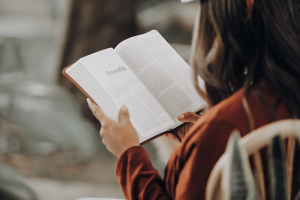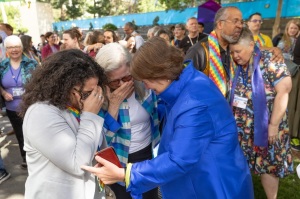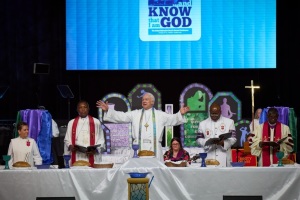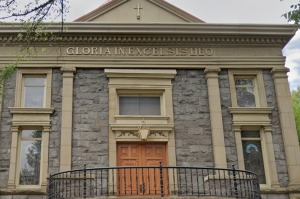Baltimore Pastor Cautions Christians Against Labeling Young Looters as 'Thugs' or 'Animals;' Says They Could Be the Church's Future Apostle Pauls
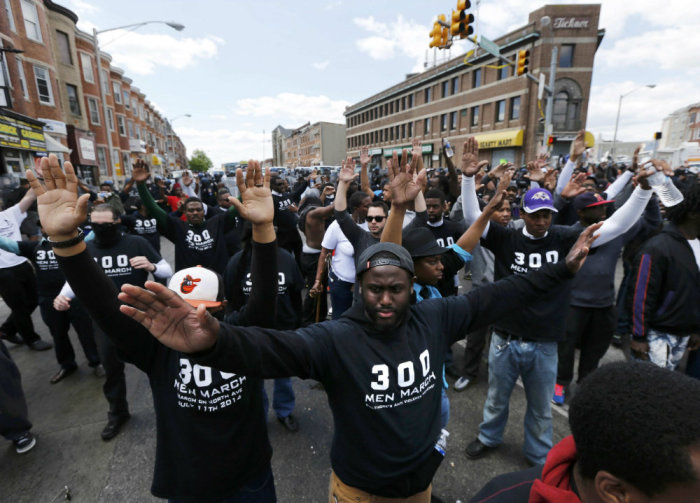
As the rioting, looting and burning of homes and businesses that erupted earlier this week threatened to overshadow the weeks-long peaceful protests that have been ongoing in Baltimore, the word "thug" began rolling off of lips and popping up on social media accounts, including on those belonging to some Christians shocked by the violent scenes playing out on TV networks like CNN. However, one Baltimore pastor, recalling the Apostle Paul's transition from the persecutor Saul, warned against simply condemning "rioters as unsalvageable thugs."
"Resist the temptation to condemn rioters as unsalvageable thugs and instead pray that God would transform these Sauls into Pauls," Dan Hyun, lead pastor at The Village Church in Baltimore, tweeted just after midnight on Tuesday.
Hyun added the hashtag "#MyStory" at the end of his tweet, suggesting that his testimony bears semblance to the radical conversion of Paul, who, before changing his name, terrorized and imprisoned Christians in the Roman Empire. The devout Jew, who the Bible says was "breathing threats and murder against the disciples of the Lord," experienced a vision of Jesus and eventually became a believer himself. The Apostle Paul remains one of Christianity's most influential leaders and the New Testament's most prolific author.
"That's been my prayer for the young people of our city here, those who are maybe on TV doing things that just make folks shake their heads. Perhaps God in His mercy will use these things to convict the hearts of those who've been involved, and this would be part of their story to turn to God," Hyun said during a phone conversation with The Christian Post on Wednesday.
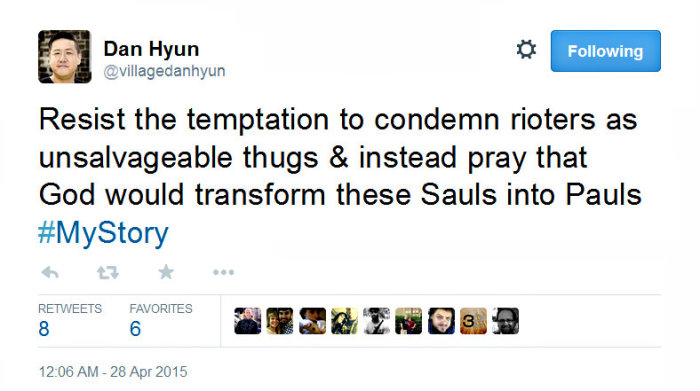
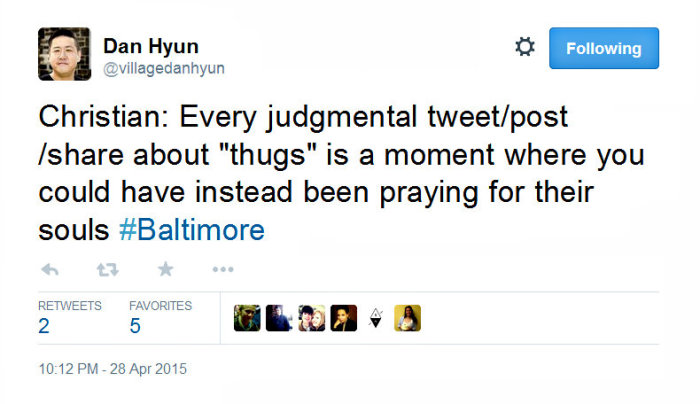
It was between the evening of Monday, April 27 and the early morning hours of Tuesday that the otherwise peaceful demonstrations that had started more than a week prior suddenly exploded with scenes of mayhem. Cameras captured some youths smashing up police cars, breaking store windows, and, joined by some adults, stealing items from stores. CNN reported, citing Baltimore officials, that 98 officers were injured, nearly 202 people arrested, and 144 vehicles and 19 structures set on fire.
Watch a 90-second video compilation of the violence that engulfed parts of Baltimore City below:
The protests, now at least two weeks old, according to a timeline of events created by The Baltimore Sun, were sparked after 25-year-old Freddie Gray was severely injured while in police custody. Gray was arrested on April 12, and subsequently hospitalized for a severed spine and crushed voice box. He died on April 19 and his funeral was held on April 27, just hours before the rioting erupted.
Gray's death in police custody is seen as characteristic of the type of aggressive policing black and poorer Baltimoreans have been experiencing for years. The investigation into the cause of Gray's severe injuries were ongoing, as were protests, which spread to other cities like New York City, Philadelphia and Boston.
Pastor Hyun, whose church has partnered with a local relief organization to assist those affected by the destruction of property, was appalled by the violence that erupted in Gray's neighborhood of Sandtown-Winchester and spread to nearby areas.
"Let's be real, it is very ugly. Some of these expressions are very ugly," Hyun said. "But if that's all you see, I think it would be too easy to just automatically judge — 'those kids just need better parents,' or you know, 'those people need better control,' 'what's wrong with those people?'"
Hyun, who has lived in Baltimore since 2006, explained his frustration with the choice of words some Christians in his social networks were using to describe the rioting and looting youths.
"Social media's been an incredibly helpful tool to get out the word for prayer, to mobilize. But I'm also seeing a very negative effect, particularly from people who have nothing to really do with Baltimore. Some of those are Christians. ... I don't necessarily expect, … People are gonna say what they gonna say. But I think it came from a lot of Christians even, using terminology like "thugs" or "animals" when referring to looters. I don't think you can follow Christ and be so casual in labeling people in that way, even if they're doing the most horrendous thing in your opinion," Hyun said.
The Village Church pastor also described some of the challenges he faces in leading a church situated in an affluent, hipster neighborhood, and whose residents were historically aggressive toward black Baltimoreans. Baltimore's population of 620,961 is 29 percent white and 64 percent black (2010 census). Among residents in Gray's neighborhood, 25 percent are on public assistance and 52 percent are unemployed. The city is divided into nine regions encompassing more than 200 neighborhoods, many of which remain racially segregated, with tensions on that point spanning more than half a century.
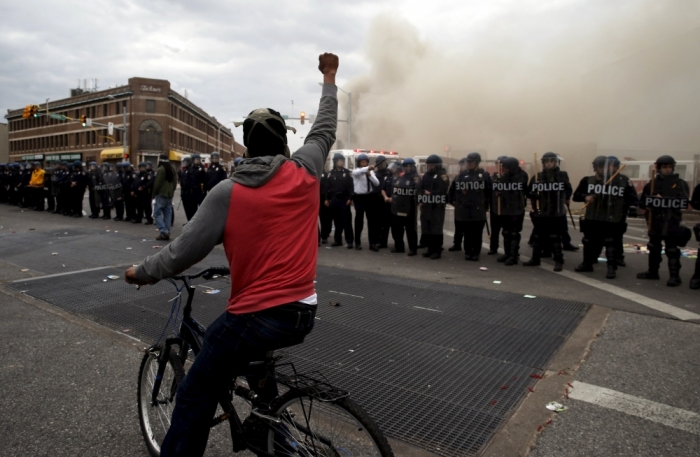
Below is the transcript of CP's interview with Hyun. It has been edited for clarity.
CP: Tell me a little about The Village Church.
Hyun: We're a church plant that started in 2008 in a neighborhood called Hampden in (northern) Baltimore. In Baltimore, I mean if you've studied a little bit, it's made up of a lot of (different) neighborhoods so there's a need for different local churches all over the place.We draw folks from throughout the city but we primarily exist in this particular neighborhood.
Obviously, we're Gospel-centered in different ways, but I would say one of our distinctives is that we express ourselves in a multicultural sense. In some ways that's the most obvious with race and ethnicity and we've definitely got that. But for us as a city it also means diversity of whether people are representing those who are local, born and bred in our city, or those who are transplants coming in for school or work or other things. It also means there's diversity with different cultures of socioeconomic levels — we don't have anyone really rich, but (it's different) compared to people who are wondering how they are going to eat tomorrow. So (there are) a lot of these different factors together, you know just building a church community out of the many different cultures coming together.
CP: What are the age ranges and ethnicities of your congregation?
Hyun: I would say at this point if we just go by Sundays, that's not representative of everything we do, but if we go by Sunday worship, we're probably 50 percent Anglo, probably 30, 35 percent Asian American or Asian and let's say 10 percent African American, and then other cultures mixed in there ethnicity wise. We're still a pretty young church, probably with an average age around 25-30, but we're starting to get more a multi-generational sense as well with more seasoned people starting to connect with the church.
CP: What kind of neighborhood is Hampden?
Hyun: Hampden is, it's a really distinct community historically, very separated in the sense from other neighborhoods. Kind of the ironic thing about our church and starting the church in Hampden is, historically Hampden was considered probably one of the whitest neighborhoods in the city, and definitely there's a lot more diversity now. But back in the day (with) previous generations, if you're African-American, for example, you just don't walk through the neighborhood because it gets really bad. That kind of sense of (intelligible).
Part of our church's call in our neighborhood is to bring (change), as the city is changing and our neighborhood as well … so you've got that sense that's still a little prevalent. But Hampden is one of the largest areas of gentrification happening in the city, I think.
So you've got a big collision of folks who are native, born and bred families ... generation after generation lived in Hampden (that) we would either call old Hampden or local. But then you've got really really large burgeoning arts, restaurant (and) music scenes in the neighborhood as well. It's got all of these different cultural factors coming together. In terms of affluence, again it really depends on who you're talking about in Hampden. There's a broad cross-section of people there.
CP: What about your neighborhood's proximity to the unrest and protests, mostly centered in Sandtown-Winchester in West Baltimore?
Hyun: In terms of what happened with protests and riots, geographically we're not that far. I think from Mondawmin, CVS, those areas that were looted, we're only a few miles from there. So it's not far, but there's really no immediate impact in this neighborhood here where we live. Tuesday morning, we woke up, the children didn't go to school. I looked out the door, it just looked like a very peaceful spring day. You would have no idea what had happened the night before in the city.
I think that's one of the challenges ... for me, it's a challenge that it's easy in Baltimore to be segmented by these different neighborhoods and people just don't cross these lines traditionally. So when bad stuff happens in a particular neighborhood, the easy temptation will be to say 'oh that's just them' or 'those people,' where obviously this is our city and we're trying to cross some of these different boundaries.
Particularly, I think in Baltimore, and you've seen some of the results of that now, as the city's been experiencing more and more gentrification and development and urban renewal, which on its face looks really positive (and it definitely has its positive sides), it forces more and more areas that are stricken by poverty or disenfranchised youth, and just pushing it more and more into certain pockets of the city. So it's just this pot that's been boiling and boiling, and I think we've seen some of the results of that.
CP: What were The Village Church members' responses to the disruptions caused by rioting this week?
Hyun: Some of our people either work or live close to areas that were impacted, but a good number of our church members, I would say they don't. But intentionally, we've been having some people go out to cleanup efforts in areas that were affected, especially the first day after the overnight (rioting and looting). We're currently in the process of just doing collections and raising up from within the church, from our people but also from our own budget, how do we financially support as well as (provide) supplies for some of the relief work.
I would say the most significant thing that we've been doing as a church is praying together. We legitimately feel it's just prayer, we're probably missing out on something, we need to be out there, we need to be with people. But we also believe this is a spiritual matter and it's very serious. If we want to see change in our city, we believe — I mean, that's why we have church — we believe we just need to see more and more disciples, more followers of Jesus. And for us, we believe that starts with prayer. So the past couple of nights we've called (for prayer at the church). It was kinda spur of moment the first night. … Yesterday, we had a little more time to prepare. But a good number of people come out just to pray and intercede for the city.
I think one of the things, the hard thing for me, a good number of people even at our prayer gathering yesterday, they probably don't have direct impact from what's going on in the city right now. Many of them are college students. But they're feeling this burden as we talk about in our church what does it mean to own the city. Not just be consumers, but to be part of the city (and) that we groan and we hurt as much as someone who's living right in an area that's being hit by either looting or rioting or some of the violence, we're feeling that in our souls as we pray together.
















